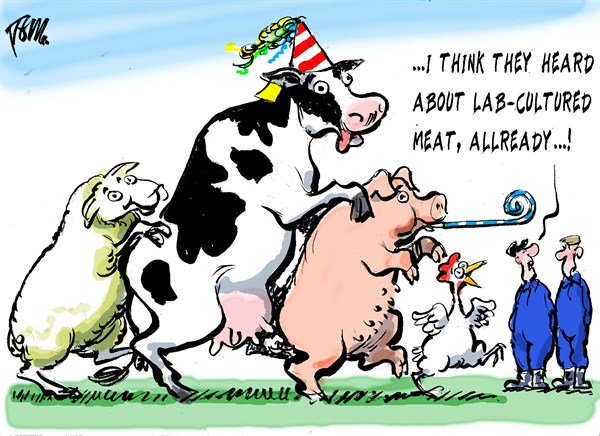Billionaires see value in plant-based food technology
March 13, 2013 Peter Fricker, special to the Vancouver Sun
Animal activists have for decades railed against the meat industry for its inhumane treatment of animals on factory farms. More recently, environmentalists have attacked intensive livestock farming because of its contribution to global greenhouse gases and its degradation of soil, water and air. Health advocates have piled on with warnings about the serious detrimental effects of the overconsumption of meat.
Yet, despite all the protest campaigns, all the alarming scientific reports and all the worthy editorials in respected journals, no one, least of all government, seems willing to restrain the relentless growth of the factory farm model, which has been adopted around the world. With global meat consumption projected to increase 73 per cent by 2050, any effort to curtail the negative consequences of meat production seems ultimately hopeless. But maybe not.
It appears someone has been listening to all the evidence accumulating against meat production and has seen not only the threat it represents, but also the opportunity. That someone is billionaire Bill Gates. And he’s just one capitalist entrepreneur whose not-so-invisible hand is behind an embryonic high-tech industry that might help save billions of animals from suffering and slaughter.
In February, Bloomberg BusinessWeek magazine reported that Gates is among several investors and venture capitalists supporting Silicon Valley startups working on “sustainable food innovation” — new firms creating imitation meat and eggs that are not only animal-friendly, but are also cheaper, better for the environment and just as tasty.
Referred to as eco-food innovators, the companies are using plant-based ingredients to mimic the texture and taste of animal products, along with their properties in food production. For example, one start-up, Hampton Creek Foods, has created a product called Beyond Eggs, which performs the same function as eggs in baking without compromising the taste or quality of mass-produced baked goods. What’s more, the company says the product will be about 19 per cent cheaper than real eggs, is healthier and has a longer shelf-life. In a taste test, Gates reportedly could not tell the difference between a muffin made with real eggs and one made with Beyond Eggs.
A reduction in the need for mass-produced eggs would decrease the need for millions of hens raised in cruel battery cages, one of the worst examples of factory farm cruelty.
Other new firms are focusing on meat replacements and have also attracted venture capital. One, Beyond Meat (backed by Twitter founders Biz Stone and Evan Williams), is already selling faux chicken that has fooled food writers in blind taste tests. Another, Sand Hill Foods, is using novel technologies that it claims will make products “substantially cheaper and every bit as good and essentially indistinguishable to a consumer who loves meat or dairy.”
These companies, which use plant-based ingredients, are in a race with another methodology aiming to replace at least some conventional livestock production. Known as in vitro meat, the process involves “growing” meat from animal cells. One start-up, Modern Meadow, has taken the concept further, proposing to use three-dimensional bio-printing to literally print meat from cells, layer by layer.
The new eco-food innovators come after already successful producers of meat alternatives, such as Turtle Island Foods (Tofurky) and B.C.’s own Gardein. The newcomers, however, claim their products will be so close to the real thing they will win over meat-eaters, as well as vegetarians.
Clearly, all this investment in alternatives to meat production is not being driven purely by altruism or a soft spot for mother hens and doe-eyed calves, but there is an understanding that factory farming is unsustainable. As one investor, Amol Deshpande of venture capital firm Kleiner Perkins Caufield and Byers, told media: “We have to find a way to replace animals as a source of protein. I don’t think the climate can subsist … with the amount of livestock that we have.”
 And Gates clearly understands the need for the
food industry to change. Last year, in a video interview he told venture
capitalist Vinod Khosla (in whose fund he invests):
“To make these things that
are cheaper, probably more healthy, less cruelty involved, less greenhouse gas
emissions — it’s quite a phenomenal thing … The fact that innovation will give
(us) equivalent (food) without those negative effects at lower prices is an
amazing example of how linear projection misses what innovators using
science
will be able to do.” When billionaires see “less cruelty” as a good investment,
animal advocates have reason to be hopeful.
And Gates clearly understands the need for the
food industry to change. Last year, in a video interview he told venture
capitalist Vinod Khosla (in whose fund he invests):
“To make these things that
are cheaper, probably more healthy, less cruelty involved, less greenhouse gas
emissions — it’s quite a phenomenal thing … The fact that innovation will give
(us) equivalent (food) without those negative effects at lower prices is an
amazing example of how linear projection misses what innovators using
science
will be able to do.” When billionaires see “less cruelty” as a good investment,
animal advocates have reason to be hopeful.
Peter Fricker is projects and communications director at the Vancouver Humane Society.
February 2017 San Francisco-based startup Memphis Meats says it has made the world's first lab-grown chicken strips from animal cells. Co-founder and CEO, Uma Valeti said: “We plan to do to animal agriculture what the car did to the horse and buggy. Cultured meat will completely replace the status quo and make raising animals to eat them simply unthinkable.”
Read more: Cultured Meat - it's here! Go to our Websites page for more!